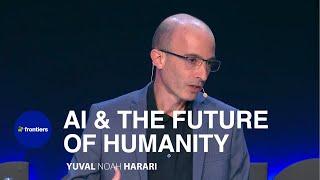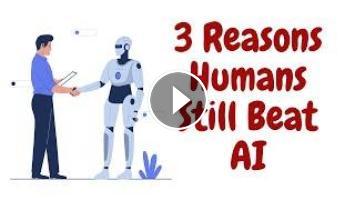#ai #artificialintelligence - Artificial Intelligence — or A I — is everywhere today.
It writes essays, creates logos, translates languages, and even makes music.
So people ask: has A I already beaten human intelligence?
The answer is no.
And here are three powerful reasons why humans still win.
Reason one: Creativity.
A I works by learning patterns from the past.
It can remix and combine ideas, but it struggles to invent something truly original.
Think about it — airplanes, electricity, smartphones, and space travel — none of these came from copying data.
They came from human imagination, from daring to dream about what didn’t exist yet.
That spark of pure creativity still belongs to us.
Reason two: Emotions and empathy.
A I can mimic polite conversation, but it doesn’t actually feel.
When you lose a loved one, no machine can comfort you the way a close friend or family member does.
When a teacher inspires a classroom, or a nurse comforts a patient, the emotional connection is real.
Humans connect through love, compassion, and empathy — something no algorithm can ever truly understand.
Reason three: Adaptability.
A I is powerful when the data is clear and the rules are set.
But what happens when life throws unexpected challenges?
A natural disaster, a sudden accident, or even a tricky everyday situation.
Humans can improvise, adjust instantly, and come up with solutions on the spot.
That’s why we’ve survived for thousands of years — not because we had perfect data, but because we adapt to whatever life throws our way.
So here’s the truth:
A I is fast and useful, but humans bring creativity, empathy, and adaptability that machines simply can’t match.
The future isn’t humans versus A I.
It’s humans plus A I — working side by side to shape a better world.
Follow for more insights.
It writes essays, creates logos, translates languages, and even makes music.
So people ask: has A I already beaten human intelligence?
The answer is no.
And here are three powerful reasons why humans still win.
Reason one: Creativity.
A I works by learning patterns from the past.
It can remix and combine ideas, but it struggles to invent something truly original.
Think about it — airplanes, electricity, smartphones, and space travel — none of these came from copying data.
They came from human imagination, from daring to dream about what didn’t exist yet.
That spark of pure creativity still belongs to us.
Reason two: Emotions and empathy.
A I can mimic polite conversation, but it doesn’t actually feel.
When you lose a loved one, no machine can comfort you the way a close friend or family member does.
When a teacher inspires a classroom, or a nurse comforts a patient, the emotional connection is real.
Humans connect through love, compassion, and empathy — something no algorithm can ever truly understand.
Reason three: Adaptability.
A I is powerful when the data is clear and the rules are set.
But what happens when life throws unexpected challenges?
A natural disaster, a sudden accident, or even a tricky everyday situation.
Humans can improvise, adjust instantly, and come up with solutions on the spot.
That’s why we’ve survived for thousands of years — not because we had perfect data, but because we adapt to whatever life throws our way.
So here’s the truth:
A I is fast and useful, but humans bring creativity, empathy, and adaptability that machines simply can’t match.
The future isn’t humans versus A I.
It’s humans plus A I — working side by side to shape a better world.
Follow for more insights.
- Category
- Artificial Intelligence












Comments